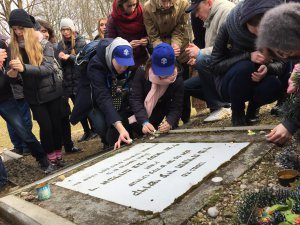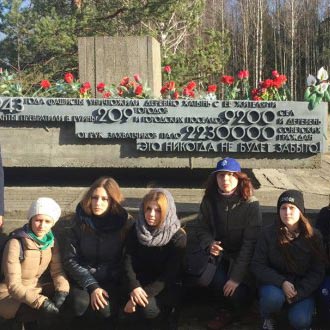There are some people for whom the price of things is paramount. But for the teenagers who spent five days visiting Jewish sites in Belarus on this year’s Masa Shorashim tour the talk is of values.
Students from the ORT Herzl Technology Lyceum in Kishinev joined teenagers from 15 other ORT schools in Russia, Ukraine, Moldova, and the Baltic States on the trip, which is supported by the Jewish Agency for Israel and the Israeli Ministry of Education. They were among 400 high school students who visited the sites of shtetls and yeshivot as well as the Minsk Ghetto, the Trostinets extermination camp and the Khatyn massacre.
“It gave me the chance to understand and feel the pain of the destroyed families and broken lives behind that huge number, 6 million,” said Sandu Chirita, a 10th grade student at ORT Herzl. “This trip has changed my view of the world. I started to understand the value of each and every human life.”
Fellow 10th grader Anastasia Chiriac had prepared for the trip by researching the band of Jewish partisans led by the Bielski brothers. At the former shtetl of Ivye, she walked on the site of a particularly dangerous rescue mission by the Bielskis in 1942 and was struck by a monument to coexistence between Catholic and Orthodox Christians, Muslims and Jews.
“And now what is going on in the world? Among the followers of these religions, conflicts occur more and more often,” Anastasia said.
At Minsk, she descended into the Pit, the place where 5,000 Jews from the nearby ghetto were shot in 1942 and into which children from the Jewish orphanage were thrown and buried alive.
“This place is soaked with the tears and pain of mourners,” she said. “We were all touched by it. Going down into it I wanted to forget everything but our duty is to preserve the memory of the Holocaust, of the dead children. This memorial will not allow us to forget anything.”
But the trip was also an opportunity to forge new but deep friendships, relationships which gave Alexandra Prastina cause for hope.
“We were able to find a common language to discuss our different views of history. This communication revealed that even at our age so many of us are interested in such important things – and that’s a cause for rejoicing,” Alexandra said.

It was not only the children who grew on the trip, their teachers, too, who found it a revelation. For Anna Curilova it was her first Masa Shorashim.
“When I was asked afterwards if I’d liked it, I couldn’t answer because of the tears which welling up in my throat,” she said. “I knew a lot about the Holocaust before this trip but I couldn’t imagine the real dimensions of the catastrophe until now.”
Ms Curilova said the trip had met its goal of reviving the national memory of the Jewish People.
As Alexandra put it: “Human memory is eternal. You can’t just erase it like a failed drawing. It firmly fits into your mind like an accidentally dropped spot of paint.”





